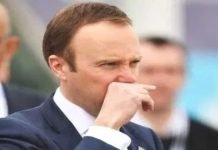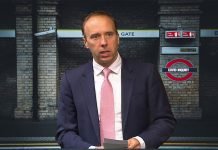Boris Johnson admitted he’d have done “many things” differently during the pandemic, during a press conference to mark the first anniversary of the UK plunging into lockdown.
It came on the day new figures from the Office for National Statistics showed a total of 149,117 people have had Covid-19 recorded on their death certificate since the pandemic began.
He told the Downing Street press conference: “In retrospect, there are probably many things that we wish that we’d known and many things that we wish we’d done differently at the time, in retrospect, because we were fighting a novel disease under very different circumstances than any previous government had imagined.
“The single biggest false assumption that we made was about the potential for asymptomatic transmission and that did govern a lot of policy in the early days, or that misunderstanding about the reality of asymptomatic transmission certainly led to real problems that we then had to work very, very hard to make up ground.”
Mr Johnson’s admission came as people across the UK have taken part in a minute’s silence to remember Covid-19 victims after a terrible 12 months that has cost the nation a loss of nearly 150,000 people.
Johnson said he believed one key error was a failure to appreciate how the disease could spread asymptomatically, while his chief scientific adviser, Sir Patrick Vallance, said lack of testing capacity and data meant the government lost control of tracking the virus’s spread.
“I think in retrospect, there are probably many things that we wish that we’d known and many things that we wish we’d done differently at the time, because we were fighting a novel disease under very different circumstances than any previous government had ever imagined,” Johnson said.Advertisement
“Perhaps the single biggest false assumption that we made was about the potential for asymptomatic transmission, and that did govern a lot of policy in the early days. All that misunderstanding about the reality of asymptomatic transmission certainly led to real problems that [meant] we then really had to work very hard to make up ground.”
Though evidence of asymptomatic transmission only became widespread public knowledge in March 2020, preliminary evidence was already being presented to the government from late January.
In the minutes of the government’s scientific advisory group for Emergencies (Sage) from 28 January, it says: “There is limited evidence of asymptomatic transmission, but early indications imply some is occurring.” It says Public Health England was investigating the prevalence of such transmission. A fortnight later, it says better testing of travellers would be needed to understand asymptomatic cases.
Johnson refused to say he regretted the decision not to lock down the country earlier, both at the start of the first wave and the second , the latter of which he is said to have personally strongly opposed.
“All I can say is we took all the decisions with the interests of the British people foremost in our hearts and in an effort to protect the public and to prevent death and suffering,” he said. “That was what we were trying to do at all stages.”
But he again refused to put a date on a time for an inquiry, saying only that “doubtless there will be a moment to properly review, to learn lessons and make sure we learn them for future pandemics”.
During the Downing Street press conference, England’s chief medical officer, Prof Chris Whitty, also conceded the country had endured “a bad outcome”, but the prime minister once again refused to commit to a public inquiry to look at the decisions taken by the government over the last year.
Rebuffing calls for an inquiry, he said lessons would be learned at the right time. He did announce there would be “a fitting and a permanent memorial to the loved ones we have lost and to commemorate this whole period”.
Both Johnson and Whitty repeated stark warnings about the risk of a third wave of infections in the UK after steep rises in European countries.
Whitty said there would “definitely be another surge” of Covid cases despite the vaccine programme, saying there would be “bumps and twists on the road” ahead, a hint at the struggles the UK has faced over new variants and the looming threat of export bans on vaccine supplies.
One year on…
Mr Johnson said that “at the right moment” a permanent memorial to those who died from coronavirus will be built and the “whole period” will be commemorated.
MPs and peers in both Houses of Parliament and ministers in the devolved nations marked the anniversary at midday, while NHS and social care workers also joined the pause for reflection.
Cathedrals in Blackburn, Winchester, Gloucester and York also fell silent in honour of those who have died during the pandemic.
The idea of a permeant memorial to our lost ones would be fitting but for the living, we would like not only to see an enquiry into the handling of the covid crisis but we would also like an audit of public money spent and to who the billions of public many were handed out to.
Support Independent Journalism Today
Our unwavering dedication is to provide you with unbiased news, diverse perspectives, and insightful opinions. We're on a mission to ensure that those in positions of power are held accountable for their actions, but we can't do it alone. Labour Heartlands is primarily funded by me, Paul Knaggs, and by the generous contributions of readers like you. Your donations keep us going and help us uphold the principles of independent journalism. Join us in our quest for truth, transparency, and accountability – donate today and be a part of our mission!
Like everyone else, we're facing challenges, and we need your help to stay online and continue providing crucial journalism. Every contribution, no matter how small, goes a long way in helping us thrive. By becoming one of our donors, you become a vital part of our mission to uncover the truth and uphold the values of democracy.
While we maintain our independence from political affiliations, we stand united against corruption, injustice, and the erosion of free speech, truth, and democracy. We believe in the power of accurate information in a democracy, and we consider facts non-negotiable.
Your support, no matter the amount, can make a significant impact. Together, we can make a difference and continue our journey toward a more informed and just society.
Thank you for supporting Labour Heartlands











